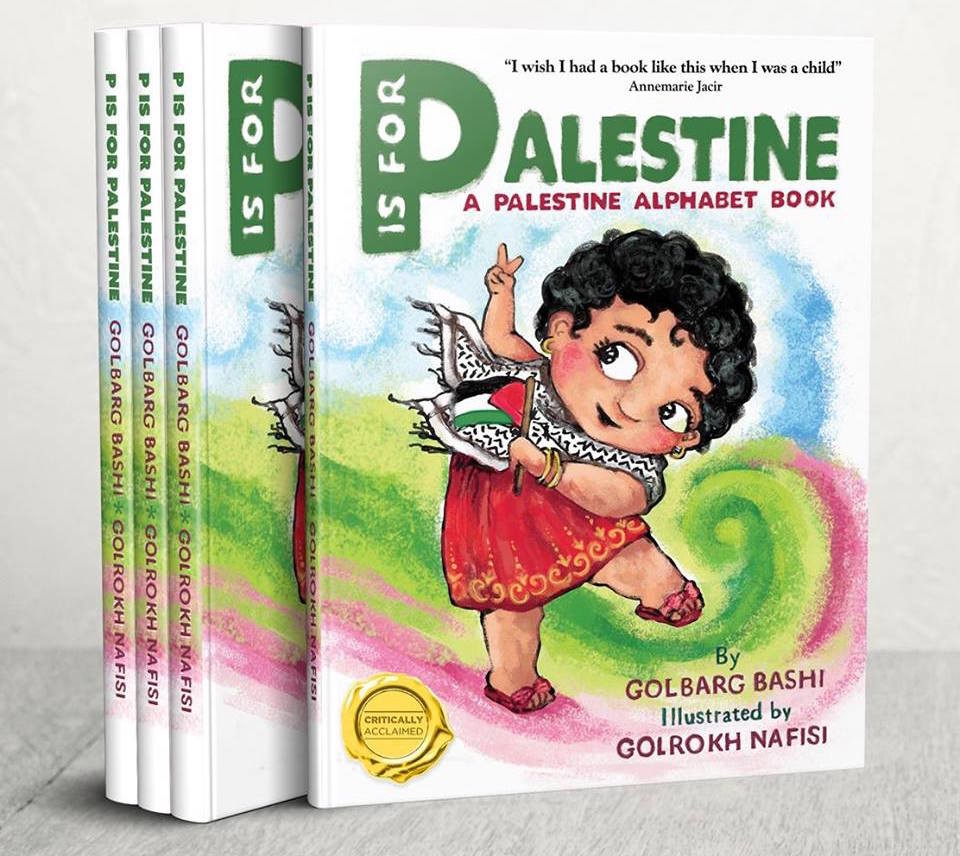NY bookstore faced crossfire over Palestine book
When Chris Doeblin agreed to buy 100 copies of a children’s book to help an author friend, he didn’t expect to become enmeshed in a controversy over international relations and free speech.
But that’s what happened after Doeblin, co-owner of Book Culture, a chain of independent bookstores on the Upper West Side, purchased and held a reading of “P is for Palestine,” which came out last month. Written by Golbarg Bashi, an Iranian-born author who has held Persian-language readings of children’s books at Book Culture for three years, it is subtitled, “A Palestine ABC Book.” The bookstore chain also donated $650 to a crowdfunding campaign for the book.
But that angered another Book Culture partner: the Stephen Wise Free Synagogue. Book Culture was set to provide books and toys for a book fair at the large Reform congregation on West 68th Street. But after discovering the bookstore’s work with Bashi, the synagogue threatened to pull out, charging that the book — especially a page on “intifada” — glorifies violence against Israelis.
In the end, the synagogue withdrew the threat, but not before putting an independent bookstore chain in the unusual position of having to make a string of statements on the Israeli-Palestinian conflict — including supporting Israel’s right to exist and opposing the boycott movement against it.
“So many people were incensed and took offense and were hurt by this book’s publication,” Doeblin told JTA. “I can honestly say I’m sorry. As we try and reach out to people, we have to do it with enough respect so that we don’t hurt and cause these violent reactions.”
This is just the latest episode of controversy that has surrounded “P is for Palestine” since it was published on Nov. 11. The picture book dedicates pages to each letter of the alphabet, along with a corresponding word — “A is for Arabic,” for example.
The main reason for the conflict wasn’t the book’s title or concept — rather it was the two-page spread featuring the letter I, which states “I is for Intifada, Intifada is Arabic for rising up for what is right, if you are a kid or a grownup!” The accompanying illustration shows a father and child waving peace signs next to barbed wire.
The Reform synagogue, along with plenty of other critics, charged that the book obscured the violent nature of the two Palestinian intifadas, or uprisings, which occurred over a span of years in the late 1980s and again in the early 2000s. More than 1,000 Israelis died in attacks perpetrated by Palestinian terror groups that targeted civilians. Thousands of Palestinians died in clashes with Israeli security forces.
“Of particular concern to me is the glorification of the Palestinian intifada — a cruel, murderous and terroristic campaign that purposely targeted innocent Israelis, including children, in restaurants, buses, hospitals, schools and shopping malls,” Ammiel Hirsch, the Stephen Wise Free Synagogue’s senior spiritiual leader, said in a statement. “The intifada was not a ‘rising up for what is right.’ It was a mass descent into immorality.”
Last month, a 28,000-member Facebook group for mothers on the Upper East Side was wracked by vitriolic debate over the book.
The dust-up between the synagogue and Book Culture began on Nov. 21, when Hirsch put out a statement demanding Book Culture “publicly rescind their support of ‘P Is for Palestine,’ a book by Golbarg Bashi that glorifies the Palestinian intifada — or Stephen Wise will cancel its upcoming book fair featuring Book Culture.”
Since then, the synagogue and bookstore have come to an agreement: Book Culture’s owners have publicly repudiated Bashi’s views but will keep selling her book. Hirsch told JTA that the synagogue is happy to partner with Book Culture as long as the bookstore chain makes clear that it does not oppose Israel. The book fair will proceed as planned.
The sides collectively issued a statement last week in which the Book Culture’s owners regretted that they “did not fully appreciate the political or communal ramifications of the children’s book.” They also stated their support for Israel’s right to exist and their opposition to terrorism and to the Boycott, Divestment and Sanctions movement, or BDS, against Israel.
The synagogue did not demand that the store pull the book from its shelves.
“We are fierce believers in the right of free expression,” a statement signed by the synagogue clergy said. “Bookstores have a critical role to play in free societies, and in particular, in our increasingly polarized country. If Book Culture wants to carry and promote Dr. Bashi’s book, it is for them to decide.”
“This is also not about Palestinian national culture or rights. We support a two-state solution,” the statement continued. “We believe that it is important for American Jews to hear the views of Palestinians.”
Hirsch, the former executive director of the Association of Reform Zionists of America, told JTA: “We do not want to host people who have anti-Israel, anti-Zionist views. I don’t know what the current or future relationship of the store is to the book. We didn’t want to get into the business of telling the bookstore what books to carry.”
Bashi, however, called the synagogue’s opposition to the book, and its initial criticism of Book Culture, “mob-like behavior.”
“I’m an Upper West Side mother myself, and I find it dismaying that a religious institution can force businesses in that manner,” she said.
Bashi rejects the idea that the word “intifada” refers primarily to terror attacks. She told JTA that she sees intifada as referring to a broader cultural and nonviolent Palestinian resistance to Israel’s occupation. Western media, she said, tend to emphasize Palestinian violence while not covering peaceful protest.
“Of course, absolutely, violence is wrong,” Bashi said.

 44.0°,
Mostly Cloudy
44.0°,
Mostly Cloudy 




